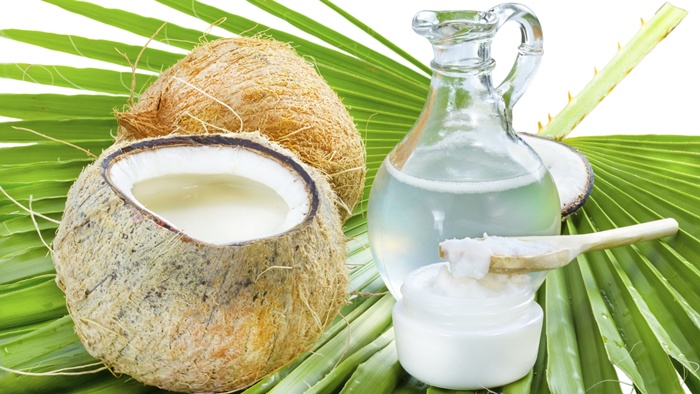
In the grand scheme of things, fat gets a bad name. Saturated fats increase cholesterol, heart disease risk and weight gain. Coconut oil and ghee are two healthy alternatives— while they contain saturated fats, they deliver health benefits as well.
Let me break it down further: Saturated fats can be found in meat and dairy products like butter, eggs, cheese and palm oils. Some health experts say that saturated fats should make up 50% of the fat in your diet. That’s a lot of fat! In fact, women on diets lose the most weight when the majority of the fat in their diets is saturated. These saturated fats also promote brain health, healthy lungs, strong bones, a strong immune system and, surprisingly, improved cardiovascular health. So really, consuming it should be a no-brainer, with all its great benefits.
The best source for saturated fats isn’t butter (sorry, butter lover; I know you’re out there!). Coconut oil and ghee are two of the best saturated fats, good for cooking or mixing in smoothies. Here’s how coconut oil and ghee compare, when it comes to your health.
Coconut Oil: Nutrition & Health Benefits
When coconuts are extracted from the meat or kernel of matured coconut palm, coconut oil is created. Coconut oil contains the highest amount of saturated fat at 92%.
Two-thirds of coconut oil’s saturated fat contains medium-chain triglycerides, which have beneficial effects on brain disorders such as Alzheimer’s disease. Palmitic acid (a type of saturated fat) is connected with higher heart disease risk; coconut oil only contains 9% of that particular fat.
Parasites, fungi and bacteria all cause indigestion. The saturated fats in coconut oil contain antimicrobial properties which help to fight the harmful substances within your body. Medium chain triglycerides (commonly known as fatty acids) go straight to the liver for energy, which makes them easy to digest.
About 50% of the fatty acids are lauric acid in coconut oil. Lauric acid is known to have heart protection benefits such as reducing high blood pressure and high cholesterol; it also contains antibacterial, antiviral and antifungal properties that help strengthen your immune system. Coconut oil is also known to contain inflammatory properties and the capric acid found in coconut oil can be effective in destroying yeast.
When you’re cooking with coconut oil, the maximum temperature for heating is about 350 degrees Fahrenheit, so no extreme heat, which isn’t a healthy cooking method anyway. Some people may be sensitive to coconut oil, which can bring ghee to the table as a possible alternative.
Ghee: Nutrition & Health Benefits
Ghee is clarified butter; it has the casein protein and other dairy properties (sugar and solids) removed, producing 100% pure butterfat. It is perfect for people with sensitivities. Ghee traditionally has been used in India and other Eastern countries. Organic and high-quality versions of ghee are typically produced from pasture-fed cows.
When ghee comes from grass-fed cows is has an abundance of amazing nutrients such as the fat-soluble vitamins A, D, E and K. It contains vitamin K2 in particular, which is among the highest natural sources of the antioxidant, and conjugated linoleic acid (CLA). CLA is known to be helpful for weight loss and aiding some forms of heart disease and cancer.
Not only this, but the more grass-fed animal products you get in your diet, the more vitamin K2 your body receives. Vitamin K2 is important for fetus development, while K2 deficiencies can lead to heart, bone and cancer problems.
Ghee contains mostly short chain fatty acids, such as butyric acid, which are used as energy by the liver, making ghee easy to digest. Ghee also contains about 5% polyunsaturated fatty acids and 27% monounsaturated fatty acids.
Best Bet: Combination of Fats
Eating a combination of saturated and unsaturated fats is important for proper nutrition and overall body function. Ghee can effectively strengthen your immune system because its fats can readily absorb the minerals and fat-soluble vitamins from other healthy foods.
Ghee is another excellent option for cooking, whereas coconut oil would be the choice for very strict vegans. Ghee may be healthy; however, it is still from an animal, whether it is pasture-raised and grass-fed or not.
Are you nuts for coconut oil or do you agree with ghee? You decide! Both are excellent choices with plenty of healthy benefits!
Related:
- Coconut Oil Vs. Butter: Which is More Healthier?
- Coconut Oil vs. Olive Oil: Nutrition, Cooking Tips, Health Benefits & Homemade Recipes Compared
Sources:
Mateljan, G., The World’s Healthiest Foods: Essential Guide for the healthiest way of eating (Seattle: George Mateljan Foundation, 2007), 55.
Gunnars, K., “Top 10 Evidence-Based Health Benefits of Coconut Oil,” Authority Nutrition web site, June 8, 2013; http://authoritynutrition.com/top-10-evidence-based-health-benefits-of-coconut-oil/.
Gremont, L., “5 Ways Ghee is More Awesome Than Coconut Oil,” Homemade Mommy web site; http://www.homemademommy.net/2013/10/5-ways-ghee-is-more-awesome-than-coconut-oil.html, last accessed May 5, 2014.













